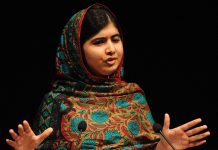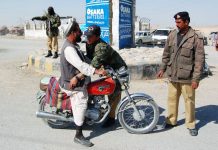Bannu: For a long time Saleem Zahib was the poet of the borderlands in Waziristan. He still is, but with a difference.
For years, Zahib, 40, was known for the passionate romantic verse he wove – a celebration of love and life in all its varied, complex forms. His longing for the beloved became the longing of a lovesick generation when his verse was put to music and read in mushairas – a gathering of poets.
“The morning breeze, go tell the beloved, my life and soul, when you see her,” he wrote years ago. “How disheveled looked her tresses, uncombed when you woke her from deep slumber. How strong her desire, when she had waited for me long. And the sorrow of her ‘ah’, when my dear heart had missed me”.
That was then. Now, like other poets of the Pakhtun belt along the Pakistan-Afghanistan border, Zahid only composes verse about loss. His passion for love and life has given to sorrow as his poetry darkens with world-weary lamentations about the militancy, terrorism and the sufferings of his people as they wander homeless in the tribal areas and the entire Pakhtunkhwa.
“Terrorism has poisoned lives of people in the Pakhtun dominated borderlands, ” Zahib told News Lens Pakistan. “People from every walk of life are affected – be it business, culture, social activity. Poets are no different. We are part of the society and our verses and thoughts reflect the joys and sorrows of our land.”
“I smell explosives in the air, I see tortured bodies on the roadsides”, said Zahid. “I left my home and hearth without any fault. I offer funeral prayers for my dear ones killed for no crime. I see young people of my area being killed or turning into militants – good for nothing. I see our schools blown up daily. How I can mention red lips, long hair and love when my beloved is out on the streets without shelter.”
Salim Raz, 76, a Pashtu and Urdu poet, writer and critic, said poets and writers were the most sensitive people of the society.
“The way our society is affected by troubles also affects literature and our writings reflect this,” said Raz. “Writers and the poets are the first to sense the changing circumstances before they can be felt by others.”
Being part of the tribal society wracked by troubles, the poets in the tribal areas were affected in a way more profound than those in the mainland Pakistan.
“The change in the mood of Pashtu poetry was seen in the tribal areas long before it manifested itself Peshawar and elsewhere,” said Raz.
“Now the beloved does not demand of her lover to bring her a black shawl from Peshawar”, said Bahar Wazir, a poet in the romantic tradition, pointing to an old Pashtu song where a girl asks for gift when she sees off her lover, leaving for Peshawar. “Rather, she stops him from going to the city as her lover might lose his life in a random bomb blast.”
Bahar said before the so-called War on Terror, the mood and style of the Pashtu poetry was different.
“Previously, the poets would mention the flowers, the garden, the beauty of his or her beloved but now it the mood has darkened as terrorism has affected Pashtu poetry like all other walks of life here,” said Bahar.
Jawed Jan, a poet and president of Wahdat Adbi Tolana (a literary society) of North Waziristan said poetry is a reflection of life – if there is war, the poet mentions its horrors, if it is peace, they write odes to love and life. Under the circumstances though, he said, a poet couldn’t possibly celebrate joys of peace amidst the sorrows of war.
“The horrors flood the imagination,” said Jan. “I want to write about something else but the immediate circumstances and thoughts take over.”
As an example of his poetry before the War on Terror, he offered something he wrote years ago in March when the trees were in blossom. : “The spring season and no fun, isn’t it strange? I don’t know where the madness has gone.”
If there is thrill in the heart, every season is spring, said Jan. But the wave of terror has taken over imagination of the poet. And so Jan says:
“Born a Pakhtun, what have I to do with flowers and spring. Unfamiliar with knowledge, what have I to do with proud ancestors. Some made me a mujahid, in the name of bravery others exploited. What I have to do with cities when I must live in black hills.”
The conflict in the region has also affected way the writers and poets view the future of the region.
Salim Raz is optimistic. He hopes for a “bright future after the darkness of the war” for the Pakhtun people. Jawed Jan saying that the conflict will sharpen the people’s faculties to survive.
“I hope we will start a new life after we go back to our homes,” said Jan. “I hope we will learn from our our faults and flaws.”
Saleem Zahib thinks differently: “Unless we get education, I see no light at the end of the tunnel. We will be used in the name of courage and hospitality. Those exploiting us will achieve their aims and nefarious designs by spilling our blood.”
He reads one of his poem, “A Tribesman without a leader”: They push me into war’s inferno, label me a terrorist, killed ruthlessly everywhere and a totem for their aspersions, am I because I am a tribesman without a leader.”



